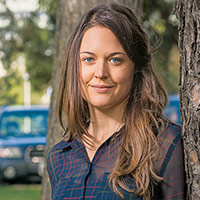Clinical Psychology Graduates Help Veterans Heal

Sarah Welton PhD ’12 is the first SPU graduate to have a postdoctoral fellowship at the VA Puget Sound Health Care System in Seattle. “War is a spiritually derailing experience,” says Welton. “Some veterans come back with a deep-seated shame and guilt, feeling like they have turned on humanity.”
These kind of struggles led the U.S. Veterans Administration in Washington state to set up the Seattle Deployment Health Clinic for soldiers’ post-combat evaluations once home. Treatment of post-traumatic stress disorder and depression may include a doctoral candidate — or graduate — from the Clinical Psychology program in SPU’s School of Psychology, Family, and Community (SPFC).
“Our students are eager to serve veterans who, for this generation of doctoral students, are often peers,” says David Stewart, associate professor and chair of clinical psychology.
When SPU’s clinical psychology program received accreditation from the American Psychological Association in 2007, doctoral students could begin to apply for internships and post-doctoral and career positions in the federal system, including VA medical centers and the U.S. military. They jumped at the chance, and SPU students are now among the single largest source of such placements in the Northwest. They’ve also earned placements in VA medical centers in Tampa, Iowa City, New Jersey, Tucson, San Francisco, and elsewhere.
What made the VA health care system take notice of them? “Our students are trained in state-of-the-art psychological intervention and assessment methods, critical to the VA and the U.S. military,” says Stewart. “They are well prepared to do the work of a psychologist and understand the science behind it. I think we educate in a balanced way that other programs don’t.”
SPU has another attraction for students interested in working with veterans: “Spirituality is a very important part of people’s lives,” says Eleni Romano, PhD ’13, whose yearlong internship was in Cleveland. “The faculty understood that and emphasized it in the program.”
Adds Welton, “That explicit integration of spirituality and psychological healing has been a highly sought-after, unique piece of my training.” In fact, even before Welton began her internship in Tucson, she played an integral role in developing a spirituality and recovery group at a Northwest addictions treatment center, offering an alternative to the 12-step approach.
“Programs in SPFC recognize the psychological, social, biological, and spiritual dimensions of persons — a truly holistic perspective,” says Mícheál Roe, dean of SPFC. “For service members or veterans, religious beliefs and practices often provide avenues of response to help with healing psychological trauma.”
(Excerpted from Response magazine)


